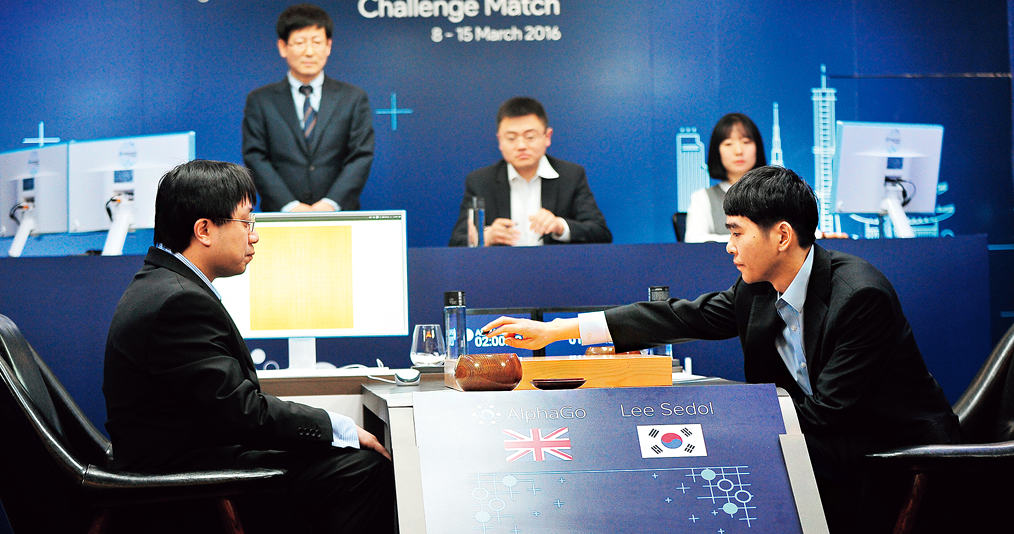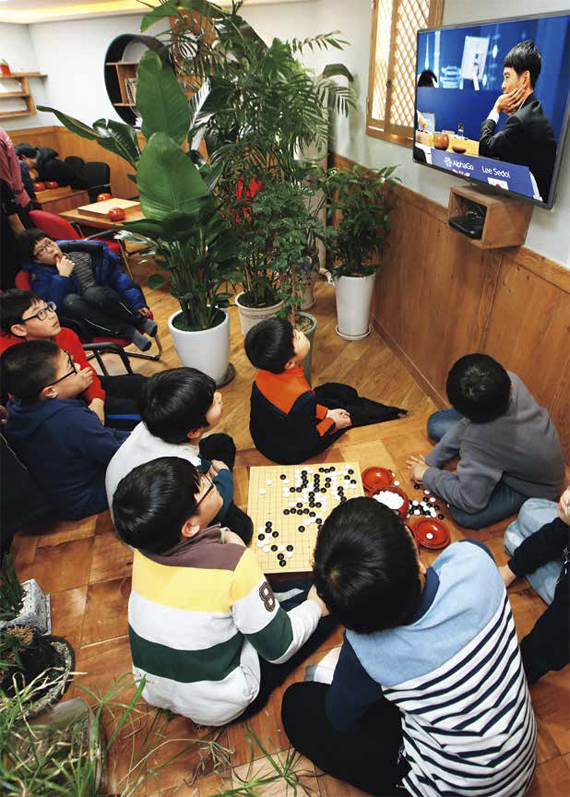Back in March, the world’s attention was focused on Seoul where the best-offive series was held between go(baduk in Korean) grandmaster Lee Se-dol and Google DeepMind’s artificial intelligence system AlphaGo. The whole worldanxiously watched to see whether the prediction that artificial intelligence (AI) would overtakehumans sometime in the future was coming true.

The 9-dan go champion Lee Se-dol (right) plays a match against Google DeepMind’s proto-artificial intelligence program AlphaGo. Sitting across from Lee, DeepMind’s lead programmer Aja Huang, an amateur 6-dan p himself, places stones on the board for AlphaGo. Lee was beaten 4-1 in the five-game match.
Finally, it came to an end — the competition between a human and a machine, the kind of thing only seen previously in sci-fifilms. The match between Lee Se-dol, a 9-dan grandmaster of the ancient board game go (fourth in global rankings), who carried the hopes of humankind, and AlphaGo, the proto-artificial intelligence system, marked an extraordinary milestone in the history of civilization. The machine’s challenge to a game whose core principles involve human intuition and creativity was an epochal event pointing to the future of artificial intelligence.
Go, the Simplest Game in the World
No game in the world could have simpler rules than go. Western board games like backgammon require special playing pieces, while chess and janggi (Chinese: xiangqí) are played with a variety of pieces. But all that’s needed to play go are the black and white pieces called “stones” and a board marked with a grid of vertical and horizontal lines. When the stones are not available, pebbles or even pieces of wood will do. At an overseas seminar some time ago, I saw a Korean professor playing go with a foreign scholar by marking their moves on a sheet of graph paper with a pencil. The rules are also so simple that anybody can learn them in just 10 minutes. In fact, there is only one rule for placing stones on the board: you can’t place your stone in a spot which has just been vacated through capture and removal by the opponent.
It is generally accepted that go originated in ancient China, and indeed it is in China that the earliest records of the game are found. One theory has it that Huangdi, or the Yellow Emperor, one of the legendary Three Sovereigns and Five Emperors of China, d the game for the education of his children. Whether that’s the case or not, it’s certain the game was already played between 475 and 221 B.C. during the Spring and Autumn and the Warring States periods, in view of references to the game in the classic texts “The Analects of Confucius” and “The Mencius.” The game was likely introduced to Korea in the fourth or fifth century, during the Three Kingdoms period.through the generations.Before computers and the Internet, go was a favorite pastime of Koreans. There was nothing like a game of go to keep two adults occupied for hours on end. Go is different from other board games in that a vast array of strategies can be used, and there is a great difference between the skill levels of professionals and amateurs. It is next to impossible for an amateur p to accidentally beat an experienced master. Hence, the barrier between skilled and unskilled ps is substantial, such that a novice has virtually no chance against an expert without a handicap.
Go has developed as a game that represents the essence of East Asian traditions, exerting a noticeable impact on the culture of each country in this region. It abounds with Eastern symbolism and mysticism, as reflected in the unapproachable world of the masters, the contrasting colors of the stones that represent yin and yang, and the board’s 19×19 grid with 361 intersecting points, which signify the myriad celestial bodies.
In Korea, many go terms are used in the fields of politics, economics, and culture. The term cho-ilkgi, which originally referred to the 60-second countdown before each move, is widely used to indicate the dwindling amount of time left before some decision must be made. Other go-based terms include kkotnori-pae, meaning only one side has a lot to lose; bokgi, an evaluation process; chogangsu, a last-ditch move; susun, a sequential move; and hogu, literally “jaws of the tiger,” referring to a serious crisis .
The Western worldview, which is often mechanical and materialistic, differs from the Eastern worldview that gives deference to human emotions and spirituality. In classical Asian literature, for example, the sound of the lid of a boiling teakettle rattling up and down would evoke a sense of pathos. In the West, however, the focus would be placed on the mechanical power of the steam that forced the teakettle lid to bounce up and down. James Watt’s steam engine, which ignited the Industrial Revolution, was born from such scientific observation, marking the historic turning point when the power of machines began to replace the physical capability of humans.
From Steam Engine to Artificial Intelligence
Furthermore, a mechanized world, once feared to make human labor redundant, moved closer to reality with the invention of the computer. With the development of modern medicine, studies have found that human intelligence is related to biochemical interaction of brain cells. When it was understood that mental disorders are not the wicked work of the devil but are caused by defective neurotransmitters in the brain, human intelligence and cognitive sciences emerged as new fields of study. Under scientific organization of a materialistic worldview, machines began to catch up with humankind’s mental capacity.
The concept of artificial intelligence first emerged in the 1960s. But it was only after the development of powerful hardware based on computer and semiconductor technology that the idea started to become reality. In addition, the sphere of artificial intelligence has been further expanded by big data memory storage with boundless capacity. Recently, artificial intelligence has made great strides in aircraft piloting, unmanned surveillance, facial recognition, spam email filtering, and investment advice, and is now making its advance into a variety of industrial sectors. It was the world’s leading IT firm Google that first caught onto these winds of change. It got off to a head start in the development of an AI system for the future through its purchase of DeepMind, the British artificial intelligence company that developed AlphaGo, for £400 million (some$650 million).
Computer’s Challenge to Human Intelligence

Students at the Lee Se-dol Go Academy in Seoul watch the Google DeepMind Challenge on TV. Lee opened the academy in 2014 to discover and train talented young ps.
dramatically demonstrate the power of artificial intelligence. After aseries of failed attempts, in a competition held in 1997, IBM’s DeepBlue computer beat the world chess champion Garry Kasparov.This victory came some 30 years after chess was first targeted fora machine versus human challenge. In 2011, IBM’s Watson supercomputerrouted human contestants in the TV quiz show “Jeopardy.”Many scientists had already predicted that humans could never beatthe computer in contests like chess or quiz games in which thenumber of answers is finite. Go, however, allows for an astronomicalnumber of possible moves and thus emerged as the next realmfor humans to defend.
Because go brings into play human intuition and Eastern traditionalthought patterns, it was long believed that artificial intelligencecould never outplay humans in this game. Indeed, existingcomputer go programs could not compete against skilled humanps. The computer was especially weak at assessing the overallstatus of a game, or reading the opponent’s intentions. But itbecame a new ballgame when AlphaGo appeared on the scene.Finally, in a five-game match between go champion Lee Se-doland AlphaGo on March 9–15, 2016, AlphaGo’s capability came as ashock. Its play was far beyond experts’ expectations. The computersoundly defeated Lee four games to one. Professional go pswere befuddled by its clever, relentless moves that were often completelydifferent from what humans would make. What seemed tobe an odd mistake at first turned out to be an unexpected strategicmove that resulted from a tremendous amount of foresight. Duringthe first three games, AlphaGo gained supremacy, little by little,without making any mistakes. On the other hand, Lee was psychologicallyshaken and made repeated mistakes, eventually concedingto the proto-artificial intelligence program.
But in the fourth game,something surprising happened. After suffering three consecutivedefeats, Lee managed to analyze AlphaGo’s strategies and earned ahard-fought victory, proving that AlphaGo was not totally invincible.
AlphaGo accumulates new knowledge and understanding byreviewing previous go games. In essence, it analyzes winningstrategies while calculating and storing all the probabilities. Whatmakes this feat possible is its vast network of hardware devices.The records of all go grandmasters’ moves and all possible variationsare stored in Google’s 1,200 CPUs and cloud storage. Alpha-Go has an absolute advantage over humans in that it can immediatelyaccess all these records without having to read and calculateagain at every move. Its key strength is its ability to identify favorablenew methods through the Monte Carlo simulation, a computerizedmathematical model that assesses an almost endless range ofpossible outcomes and probabilities. Humans can calculate probablego moves on the board at the rate of 30 times an hour, butAlphaGo can do the same thing more than a million times an hour.As a result, in the contest with Lee, the computer succeeded incoming up with new moves that humans could never have thoughtof so quickly. Its seemingly strange moves, which initially dumbfoundedonlookers, turned out to be a brilliant maneuver in hindsight.
Lee’s defeat does not mean a loss of human dignity in the world of go. Though it is now clear that human calculations can also be performed by machines, the issue is ultimately the relationship between people, since the operation of any computer still depends on human guidance.
AlphaGo’s Weak Spot
Emerging from the match, Lee declared, “The time has cometo review go theories all over again.” This remark most accuratelysummed up his contest with AlphaGo. The emergence of thisartificial intelligence system has served as the turning point for are-examination of existing go theories. Regrettably, however, gomatches with a machine end up as a single-person event that precludesthe emotional exchange between ps, which is an integralaspect of the game. As Lee noted, “Robots will never understandthe beauty of the game the same way humans do.”
Lee’s defeat does not mean a loss of human dignity in the worldof go. Moreover, there is little possibility that AlphaGo, which specializesonly in go, will enter the human sphere and start to takecontrol anytime soon. It is a stretch of the imagination to saythat the duel between Lee Se-dol and AlphaGo amounted to amachine’s dominance of humans. Though it is now clear thathuman calculations can also be performed by machines, the issueis ultimately the relationship between people, since the operation ofany computer still depends on human guidance.
What’s important is not a clear dichotomy between humans andartificial intelligence, but their coexistence in a proper manner. Onlythe technologies that can understand humans will be able to survive,as seen in the recent failure of 3D TVs.
Cho Hwan-gue Professor of Computer Engineering / Pusan National University